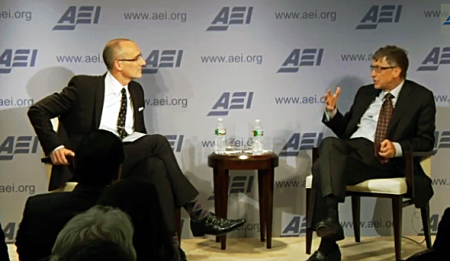Obama Supporter Bill Gates Doubts Minimum Wage Hike

Tech billionaire Bill Gates expressed doubts about the impact of an increase in the minimum wage, despite his long-time support for President Barack Obama, who publicly endorses the policy idea.
"When people say we should raise the minimum wage, I worry about what that does to job creation," Gates, Microsoft founder and cofounder of the Bill and Melinda Gates Foundation, declared at a Washington, D.C. event at the American Enterprise Institute on Thursday. The business giant argued that a minimum wage increase would "dampen the demand for labor."
Gates paraphrased Robert Dohrer, chair of the Forum of Firms at the International Federation of Accountants, who noted that "poverty in the United States is often related to employment and economic growth." The Microsoft founder warned that "capitalism over time will create more inequality and technology over time will adjust labor demand," meaning that the rich will become richer and the poor will lose their jobs and be replaced by machines.
Instead of taxing income and trying to raise the minimum wage to make up for the plight of the American worker, government should tax consumption, Gates argued. "I think economists would have said that a percentage consumption tax is better [than an income tax] at any point in history," he declared.
The Real Inequality Problem
Gates argued that rich people should not feel guilty for having a great deal of money, but for spending it in an irresponsible way that does not benefit others, especially the poor. "Inequality of consumption is the real injustice," he proclaimed, deemphasizing the current debate about income inequality.
The businessman also attacked inequality of opportunity as a real problem in today's America. The Bill and Melinda Gates Foundation focuses all its domestic energy on education in order to provide more opportunity, Gates reported.
Irresponsible spending and failing schools represent the more fundamental inequality problem, Gates insisted. "We should understand inequality of opportunity and inequality of consumption way better than we do today," he declared.
Teacher Evaluation and Common Core
"The greatest cause of inequity is the failure of our educational system," Gates asserted. He articulated his support for research into teaching practices and the Common Core federal education standards.
Gates lamented the small "amount of actual research that goes on as to why some teachers are extremely good." His foundation is picking up the slack in this area, the Microsoft founder said, but there is a great deal of work to be done on it.
Arthur Brooks, president of AEI, suggested that one of the reasons U.S. schools lack robust teacher evaluation is the strength of unions. Gates denied this however. "Our education is very poor across the entire country, and it does not correlate to unionization." He pointed out that the state of Massachusetts is very unionized, but still has a strong education system. "There is no single factor in the fifty states that, where that's been removed, something like Asia is taking place," he explained.
Gates supported the Common Core initiative because it enables smaller curriculum companies to compete with large ones, he argued. With education standards differing between states, a company can only master one state's methods, and only a massive company can cater to multiple states. But if the states adopt similar standards, small companies can have a multi-state market.
"Scale is good for competition," Gates explained. He argued "pro-capitalistic people" should support Common Core because it would drive innovation.
Most of the World Will Be Rich by 2035
"It's overwhelming how prosperity is spread around the world from say 1960 to today," Gates declared. Nevertheless, 45 countries still rank in The World Bank's lower income category. "By 2035, there will be less than ten," the billionaire predicted.
Gates argued that the primary cause of poverty worldwide is disease. "Eighty percent of why a poor child is more likely to die than a middle-income child is due to diseases," he explained. Forty percent of African children are too sick to develop the mental ability to read and write. "I think the greatest injustice is in the area of health," Gates declared. "A child dying is an injustice no matter where it happens in the world."
The Bill and Melinda Gates Foundation spends "a little bit over half" of its energy on this issue, and the billionaire predicted that "it will take us 30 to 40 years to really be done with those." He explained that in 1960, 20 million children were dying per year, but today only 6 million are, and he insisted that "we can get that below 3 million a year."
"We can basically save a life for about $2,000," Gates declared. He argued that there are more than 6 million people who would not be alive today without his foundation's work on vaccine development and coverage.





















